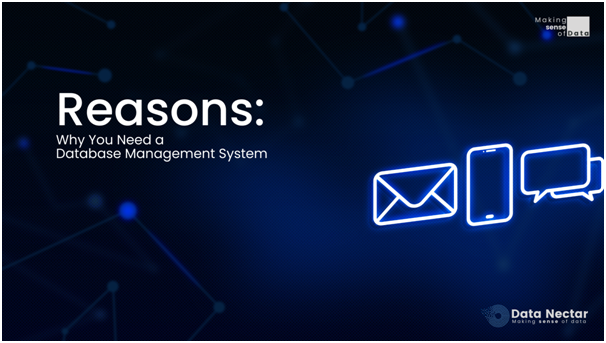If you’re managing a business, organization, or any other complex system, you’re probably generating and collecting a lot of data. This data can be incredibly valuable, helping you to make informed decisions, identify trends, and optimize your operations. However, managing this data can be a major challenge in itself.
That’s where a database management system (DBMS) comes in. Here are five reasons why you need one:
1) Efficiency:
Manually managing large amounts of data can be incredibly time-consuming and error-prone. With a DBMS, you can automate many of the most tedious tasks, such as data entry, organization, and retrieval. This can save you a significant amount of time and reduce the risk of errors.
A database management system (DBMS) can help you to manage and organize large amounts of data efficiently. This is especially important for businesses and organizations that generate a lot of data, as manually managing this data can be incredibly time-consuming and error-prone. With a DBMS, you can automate many of the most tedious tasks, such as data entry, organization, and retrieval. This can save you a significant amount of time and reduce the risk of errors.
For example, imagine that you run a customer service center that receives hundreds of emails per day. Without a DBMS, you might have to manually enter all of this data into spreadsheets or other applications, then sort and organize it by hand. This could take hours or even days, and the risk of errors would be high. With a DBMS, you can automate much of this process, allowing you to quickly and accurately enter, organize, and retrieve data.
2) Security:
Your data is valuable, and you need to keep it secure. A DBMS can help you do that by providing robust security features, such as encryption, access controls, and backup and recovery options. This can help you protect your data from theft, loss, or corruption.
Data security is a major concern for businesses and organisations of all sizes. You need to ensure that your data is protected from theft, loss, or corruption, as well as unauthorised access or manipulation. A DBMS can help you do that by providing robust security features, such as encryption, access controls, and backup and recovery options.
For example, a DBMS can encrypt sensitive data, such as customer information or financial records, to prevent unauthorised access or theft. It can also provide access controls that limit who can view or modify data, reducing the risk of internal security breaches. Finally, it can provide backup and recovery options that allow you to quickly restore data in the event of a disaster, such as a power outage or natural disaster.
3) Scalability:
As your business grows and your data needs increase, you need a system that can keep up. A DBMS can provide scalability features that allow you to store and manage ever-increasing amounts of data without sacrificing performance or stability.
Scalability is another important consideration when it comes to managing data. As your business grows and your data needs increase, you need a system that can keep up. A DBMS can provide scalability features that allow you to store and manage ever-increasing amounts of data without sacrificing performance or stability.
For example, a DBMS can provide horizontal scaling, which allows you to add more servers or storage devices to accommodate growing data needs. It can also provide vertical scaling, which allows you to upgrade hardware components to improve performance. Finally, it can provide data partitioning, which allows you to distribute data across multiple servers for faster access and retrieval.
4) Integration:
Chances are, you’re using multiple software applications to manage different aspects of your business. A DBMS can help you integrate these applications and streamline your operations.
Many businesses and organizations use multiple software applications to manage different aspects of their operations. For example, you might use one application to manage customer information, another to track inventory, and a third to process payments. Managing all of these applications separately can be time-consuming and error-prone.
A DBMS can help you integrate these applications and streamline your operations. For example, it can provide APIs (application programming interfaces) that allow different applications to communicate with each other and share data. It can also provide tools for data mapping and transformation, allowing you to convert data from one format to another as it moves between applications.
5) Analytics:
Finally, a DBMS can help you gain insights from your data and make informed decisions. By providing tools for data analysis and reporting, a DBMS can help you identify trends, spot opportunities, and optimize your operations.
Data analysis and reporting are essential for making informed decisions in business and other fields. A DBMS can provide tools for data analysis and reporting, allowing you to gain insights from your data and make informed decisions. For example, it can provide tools for data mining, which allow you to identify patterns and relationships in your data. It can also provide tools for reporting, which allow you to generate visualizations and reports that help you understand your data.
Conclusion:
In summary, a database management system (DBMS) can provide a range of benefits for businesses and organizations of all sizes. By improving efficiency, security, scalability, integration, and analytics, a DBMS can help you manage and leverage your data more effectively, allowing you to make informed decisions and optimize your operations. So if you’re managing a lot of data, consider investing in a DBMS to help you manage it more effectively.
Author Bio:

Amisha Chauhan, Data-Nectar is a Business Associate and Digital marketing manager at Data-Nectar, which is Data Analytics and Consulting services company, helps our clients to optimize the use of data assets to make profitable, well-informed, faster, and proactive business decisions – be it long-term, short-term or strategic. I work with a handful of companies writing
compliance-specific content and more broadly informational materials.









